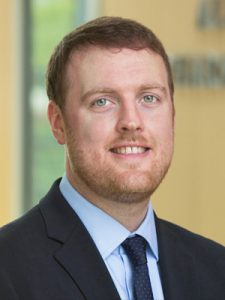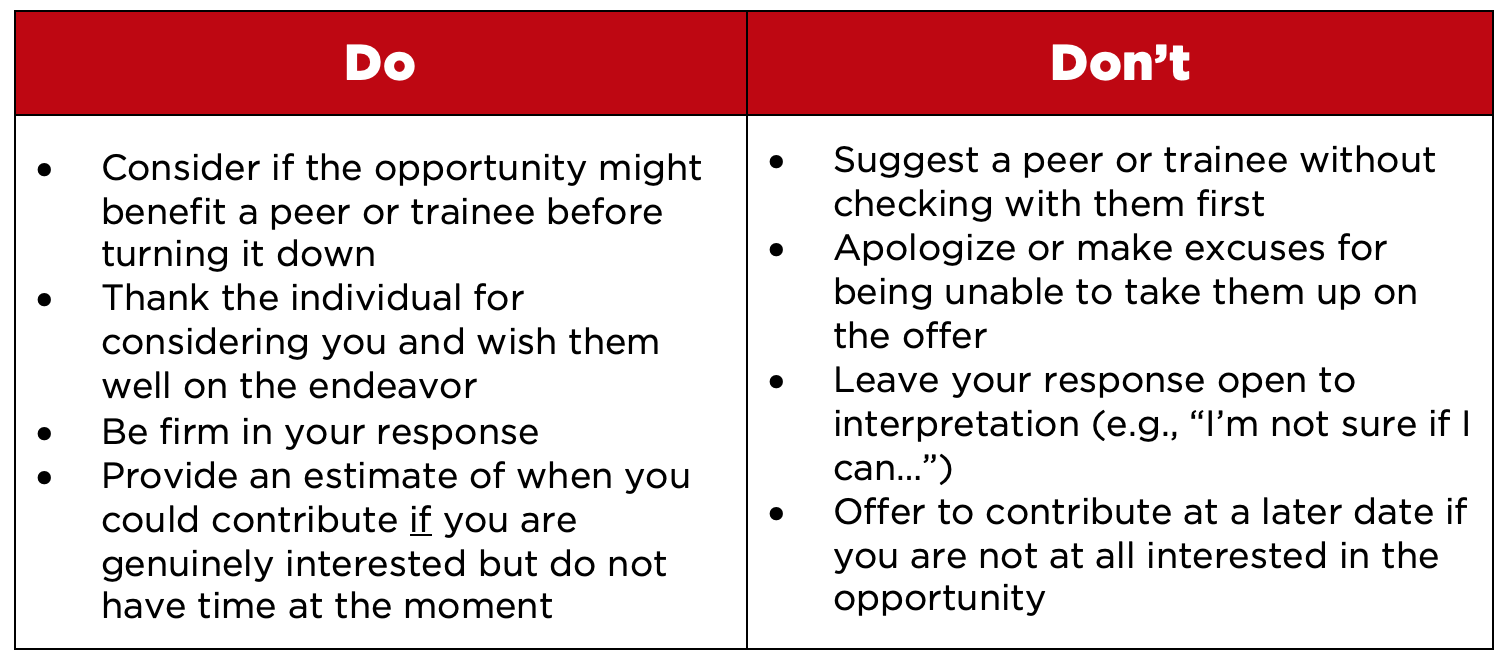Share this post:
Author: Brent N. Reed, PharmD, BCCP, FAHA
Many of you are finishing up school or postgraduate training and are preparing to embark on your career as a new practitioner. One of the most unnerving aspects of this transition will be your newfound sense of autonomy – no more required assignments or examinations, or learning “opportunities” strongly suggested to you by an advisor, preceptor, or program director. As you wrap up all of your requirements ahead of graduation, you’ll also notice another unfamiliar feeling. It’s called free time.
Both of these sensations will undoubtedly feel a little uncomfortable at first, and you’ll probably want to alleviate them by filling up your free time with a number of professional commitments of your choosing. In this post, I’ll share a few thoughts about one of the most important skills you should focus on developing during this critical transition: learning how to say “no.”
Envision the Long Arc of Your Career
Most of your training has consisted of structured learning experiences, such as a series of patient care rotations or a longitudinal research project, each with a finite timeline. However, a distinguishing feature of your career will be its gradual evolution over time, and the varying scope and duration of responsibilities that come along with it. Rather than viewing your career as an extension of your training and an endless series of isolated projects, envision what you hope the long arc of your career will be. Instead of basing your decisions on what everyone else expects of you, select the pursuits that will bring you long-term personal and professional satisfaction. What do you want to be an expert in? What do you hope others will turn to you for? Once you have the answers to these types of questions, you can be more selective in the opportunities and experiences that come your way. And if your interests change with time, allow yourself the freedom to bend that arc in a new direction.
Harness the Power of the Delayed “No”
As a new practitioner, you’ll be presented with a number of new and exciting opportunities, and it may be tempting to say “yes” on the spot, without taking a moment to reflect on whether it’s a great fit for you or something you can accomplish in a reasonable timeframe. It can be especially difficult to say “no” when these opportunities come from a leader in your organization or from someone you admire. One way to avoid this dilemma is to learn the power of the delayed “no.” Set a rule for yourself to consult a mentor before agreeing to a new opportunity, or turn to a friend or family member who can help put things into perspective. Even if you do not end up discussing it with someone else, simply deferring the decision will provide you with the breathing room necessary to make a more well-informed decision. If you do decide to say “no”, below are some dos and don’ts for making that response more successful.
One of the key takeaways from my workshops on workplace productivity is to get into a habit of blocking off time on your calendar to focus on your most challenging work, just like you would for an important meeting. What most people don’t realize is that I often do the same thing for my commitments outside of work. This is intended to guard against another temptation you’ll face as new practitioner – the tendency to let work spillover into your nonwork life. If you find yourself suddenly facing a considerable amount of free time after you complete your training, you may be tempted to let work monopolize it. By blocking off your time for nonwork activities, you’ll build in some extra guardrails to ensure you’re giving the important things in your life the time and attention they deserve.If It’s Important to You, Block it Off
As I sat down with my residents to perform their final evaluations for the year, I encouraged them to consider something I regret not doing at the end of my training: a reset. When you’re in the throes of school or postgraduate training, it can be difficult to recognize just how abnormally hard you’ve been working. More importantly, it can be challenging to understand just how unsustainable that pace is in the long run. It’s been ten years since I graduated pharmacy school and I’m just now getting to a point where I feel like my pace is sustainable. Learn from my mistakes: use this time to say “no” – not to everything, but to just enough that you can say “yes” to the right things.
 |
Brent N. Reed, PharmD, BCCP, FAHADr. Reed is an associate professor in the Department of Pharmacy Practice and Science at the University of Maryland School of Pharmacy, and practices as a clinical pharmacy specialist in advanced heart failure at the University of Maryland Medical Center in Baltimore, MD. Follow him on his website or on Twitter @brentnreed. |
Share this post:

